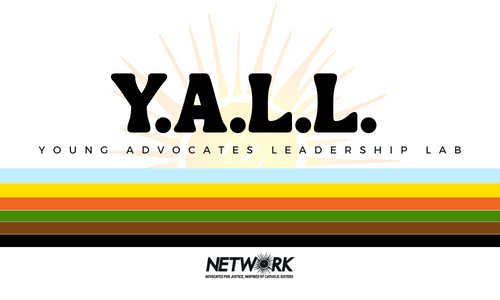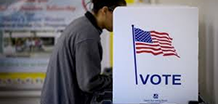Hispanic Heritage Promotes Democracy and Dignity
My Responsibility is to Help Build a Future Where We All Have a Share in the Decisions That Shape Our Destiny
Jonathan Alcantara
October 6, 2025
For Hispanic Heritage Month (September 15-October 15), NETWORK’s Sr. Carol Coston Fellows share their thoughts on the importance of this observance in the U.S. The following is Part 2 of a two-part reflection by Jonathan Alcantara of Marquette University. (Read Part 1.)
In addition to undeniable economic and cultural contributions, the Latino community also participates powerfully in the democratic process. In particular, young Latinos are the fastest-growing demographic of voters, and our voices will shape the future elections. However, targeted voter suppression tactics like disinformation and misinformation, lack of access to absentee ballots, limited early voting, and bans on students using their school IDs at the polls continue to create barriers for young Latino voters.
So, over the past two years, I’ve served as a Sr. Carol Coston Fellow, working with other students and young adults in Wisconsin and across the country to foster a safe environment for civic engagement and support voter registration on our campuses. All of the meaningful conversations I’ve had with my peers on campus and with community leaders show and remind me that our democracy is stronger when we all participate and a lot weaker when we’re separated and pushed out.
Despite the inequalities, political tensions, and fearmongering, our lucha and resilience still define us. Across the nation this month, Latino communities are finding ways to gather and celebrate their heritage while navigating their fears. In cities like Chicago, Madison, and Appleton, Wisconsin, festivals celebrate with live music, dances, and traditional food. They also have workshops and representatives talking about healthcare, business inclusion, and professional leadership.
However, many events have scaled back and have even been postponed because of the possibility of immigration raids, but one thing’s for certain, seguimos unidos y en solidaridad, no matter the obstacles. Our culture is still alive not only in the happy moments but also in times when we must pivot, adapt, and continue showing up for one another through advocacy.
What ties all of this together is the set of values that go with the Latino community. We strongly believe in familia, dignidad, and oportunidad, which are values that anyone, regardless of their background and what they look like, can recognize as important. My Catholic faith reminds me that these are more than just cultural values; they are moral truths: that every person is made in the Imago Dei and deserves respect, freedom, and the chance to grow and thrive, no exceptions. In our faith, we say, cada persona es hijo de Dios, every person is a child of God. And that truth calls us to treat every person with the same dignity and respect.
Looking ahead, I see a hopeful future where our cultura is not only honored by others but fully integrated into the story of this country. A future where Latino students, like me, succeed in college without the barriers that are currently holding us back, where workers earn livable wages that match their contributions to our country, where families can live without the fear of leaving their house for five minutes, and where our voices are fully recognized in the public.
This vision is attainable, and this is why Hispanic Heritage Month matters. Is it about honoring culture? Yes. But it’s also about defending human dignity, expanding and growing economic opportunity, and strengthening our democracy. For me, Hispanic Heritage Month is both personal and shared. This month calls me to remember the resilience of those who came before me and to act with the knowledge of my responsibility for those who will come after me.
This month, I celebrate my heritage not only by remembering the past but by helping build a future where every family, Latino or not, can live, work, and thrive con fe, esperanza y orgullo, no exceptions.
Learn more about NETWORK’s Young Advocates Leadership Lab (Y.A.L.L).










